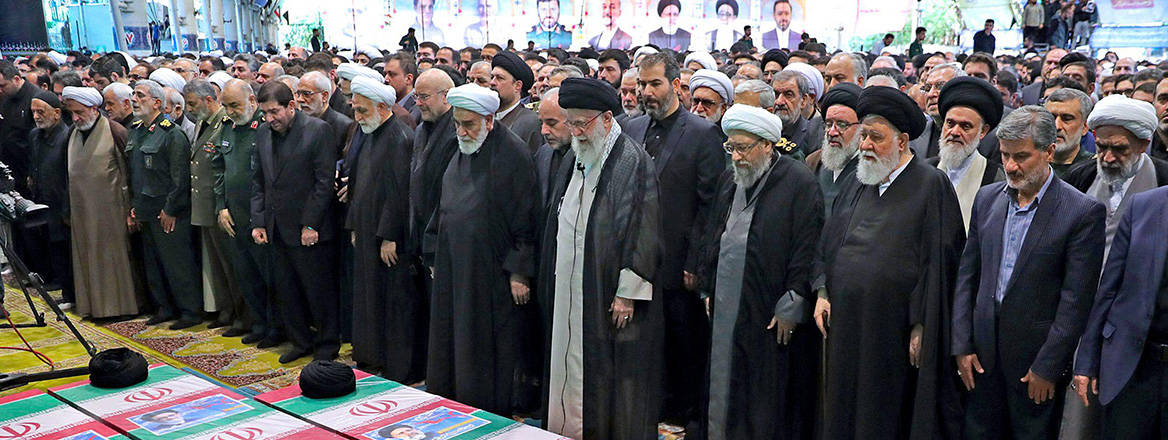Iran’s Leaders Look to Steady the Ship After Raisi’s Death
Following the recent helicopter crash that killed Iran’s president and a number of other senior officials, the leadership of the Islamic Republic is hoping that a swift election will prevent any potential instability.
The sudden death of Iranian President Ebrahim Raisi and a handful of senior officials including Foreign Minister Amir Abdollahian in a dramatic helicopter crash in Northwest Iran has rocked the political establishment in Iran, even if it has elicited a mixed reaction among the wider population. Indeed, the general sense of shock has been tinged with elation among his many victims, not least those who suffered from the violent repression of the Woman, Life, Freedom protests in 2022. For them, his demise represents another nail in the coffin of an increasingly despised Islamic Republic.
It is this gulf between the state, its loyalists and wider society that is driving a swift and – from the regime’s perspective – hopefully seamless election for the presidency, which in accordance with the constitution has now been set for 28 June. The last thing the regime wants is excitable people on the streets, though it will have been encouraged by the show of loyalist support during the funeral of Raisi and the other officials. As some jockeyed to make their presence felt – a prerequisite for anyone hoping to stand in the forthcoming elections – there were some notable absences. Not one of Iran’s former presidents attended.
One should not forget that Raisi was a controversial figure across the spectrum. If moderates loathed him because of his revolutionary puritanism and membership of the ‘death committee’ – an ad hoc judicial committee set up to oversee the extrajudicial murder of 4,000 political prisoners in 1988 – then hardliners grew increasingly tired of his managerial incompetence. For all the show of sympathy, manoeuvring has already begun among aspiring candidates, with some conjecturing that Khamenei may allow some modest competition to take place. All this, of course, serves to generate discussion about the ‘competitive’ nature of politics in the Islamic Republic – though if recent experience is anything to go by, it will remain just that.
As the Islamic Republic faces its latest crisis, it remains to be seen whether it will seize the opportunity to modify if not change course, or simply double down on the path now well trodden
At the same time, there is growing criticism over the manner of Raisi’s departure. It has not shed the most positive light on the inner workings of the Islamic Republic. If the attack on Israel brought plaudits from loyalists encouraged by the apparent show of might, many of these same people are now asking how it was that the president was allowed to travel in a helicopter in such poor weather conditions and across such treacherous terrain. Quite apart from the conditions, some are questioning just how it was possible for the president’s helicopter to vanish without the other two escorting helicopters noticing. The information management also appeared to be chaotic, with some outlets posting notices that all was OK at the same time as officials were indicating that they had in fact made contact with the passengers. Others questioned why it took a Turkish drone to find the crash site.
Matters took an even more surreal turn when it was discovered that the Turkish drone had apparently flown over an IRGC missile site, streaming its images live as it proceeded. Meanwhile, the commander of Iran’s missile forces, Amir Ali Hajizadeh, meanwhile thought it prudent to offer a swift denial that the crash had anything to do with his forces – it would seem that some had raised the spectre of the shooting down of a Ukrainian airliner back in 2020. The haphazard manner of the search and the failure to seal off the site once it had been discovered all served to fuel the criticism, with the inevitable tilt towards conspiracies theories. If the regime eschewed the tendency to blame the Israelis – to do so would have only highlighted its own woeful security – it did not take long for hardline journalists to suggest ‘foreign’ interference, while former foreign minister Javad Zarif wasted no time directing the habitual charge against US sanctions. More astute commentators, of course, noted that Iran preferred to send its senior officials in US-built helicopters bought second-hand more than 20 years ago, rather than in vehicles built by its new Chinese and Russian allies.
As the Islamic Republic faces its latest crisis, it remains to be seen whether it will seize the opportunity to modify if not change course, or simply double down on the path now well trodden. Whatever Khamenei chooses to do in the next four weeks, it is unlikely to affect the overall strategy. Raisi was a technocratic enforcer and little else (he was not, certainly in my view, a serious contender for the leadership), and while Khamenei will no doubt lament that his one president who proved to be a loyal lieutenant was rudely taken away from him, there is no shortage of aspiring hardliners to take his place. The difficulty will be to find someone quite as politically pliant.
The views expressed in this Commentary are the author’s, and do not represent those of RUSI or any other institution.
Have an idea for a Commentary you’d like to write for us? Send a short pitch to commentaries@rusi.org and we’ll get back to you if it fits into our research interests. Full guidelines for contributors can be found here.
WRITTEN BY
Ali Ansari
RUSI Senior Associate Fellow, International Security
- Jim McLeanMedia Relations Manager+44 (0)7917 373 069JimMc@rusi.org


